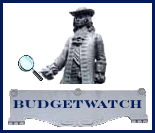- Home
- About
- News
- Tax Reform
- Ethics Reform
- Budget Reform
- Reformer’s Roundtable
- Contact Us







Mayoral Campaigns: Nipped In The Budget
 When it comes to the 2007 campaign, it is clear that the city budget is not a major issue for the candidates or their campaigns. In a city where the murder rate continues to climb, where the school district faces a new crisis, where residents face a lack of jobs and economic opportunity, and where a host of new threats and opportunities present themselves each day, one might conclude that the candidates are wise to focus more attention on these concerns and less attention on the minutiae of the budget. After all, who wants to elect a Mayor or Councilmember who promises to “establish a transparent budget process” when we can elect a Mayor who will “make Philadelphia safer” or “increase opportunity for residents?” But, Philadelphians will miss a real opportunity if we fail to challenge the candidates for elective office about their approach to budgeting and how we will raise and spend the money necessary to realize their visions.
When it comes to the 2007 campaign, it is clear that the city budget is not a major issue for the candidates or their campaigns. In a city where the murder rate continues to climb, where the school district faces a new crisis, where residents face a lack of jobs and economic opportunity, and where a host of new threats and opportunities present themselves each day, one might conclude that the candidates are wise to focus more attention on these concerns and less attention on the minutiae of the budget. After all, who wants to elect a Mayor or Councilmember who promises to “establish a transparent budget process” when we can elect a Mayor who will “make Philadelphia safer” or “increase opportunity for residents?” But, Philadelphians will miss a real opportunity if we fail to challenge the candidates for elective office about their approach to budgeting and how we will raise and spend the money necessary to realize their visions.
The budget documents our good intentions as a city — it shows our concerns (where we decide to spend our money), our values (what activities we decide to discourage through taxation), and our aspirations (which investments we make in programs). That is the poetry of the budget; the soaring rhetoric that inspires our nobler goals. But, the prose of the budget is simply a collection of priorities and assumptions that declares where money goes. We are always able to make different decisions about where money will come from and where it will go.
When it comes to the campaign, candidates are always more than happy to discuss how we should do more to address the woes that beset the city. Grandiose plans and simple visions are routinely advanced in an effort to win our favor (and our votes). But, the details about how to pay for those plans and visions are often lacking and candidates generally offer much less detail about how they would change the priorities and assumptions in the city budget so that we can realize their visions and implement their plans.
Happily, in Philadelphia, our government establishes a Five-Year Financial Plan to give an idea about how money will be raised and spent over the coming years so candidates — and incoming officials — have a blueprint from which to work. Every candidate for office who offers an idea should also be prepared to detail which assumptions and priorities he would alter in the City’s Five-Year Financial Plan. Candidate Smith says the city should have more after-school programs? Great — now let’s hear where the new money for the program will come from or which expenditures will be cut to fund her idea. Candidate Johnson says the city should clean the streets? Wonderful — now let’s hear how we would pay for it or how we won’t pay for something else to allow us to do it.
In the race to become Philadelphia’s next Mayor, there has been no shortage of worthy ideas about how to spend public money on new and expanded programs and there has been a lot of discussion about tax reform and how to change the way we raise money as a city to fund our public expenditures, but there has been little talk from the major candidates in the Democratic Primary about how the new plans would alter future budgets.
Mayoral candidate Michael Nutter has offered the most detail about the cost implications of his plans and how he would pay for them, preparing a full 11-page position paper on the changes he would make to the budget process and an accounting of the costs of his proposals along with how he would find money in the City’s current Five-Year Financial Plan to fund his ideas.
Candidate Tom Knox has consistently declared that he would fund programs by addressing waste, fraud, and mismanagement in City government.
Candidate Chaka Fattah has proposed a plan to lease Philadelphia International Airport to fund some of the programs he would initiate. Candidates Bob Brady and Dwight Evans have suggested that they would seek funding from Harrisburg and Washington to fund their visions.
In the end, Philadelphia will have a new Mayor and it is imperative that we choose a Mayor who not only has a vision, but a plan to make the vision a reality. That’s where the budget comes in and where a realistic approach to raising revenues and making expenditures must be demanded. We should accept nothing less from our candidates than a sound plan to raise and spend public money in an effort to make Philadelphia the city we know it should be.
Philadelphia Forward asked each candidate to record a video response to address how we can help reduce the cost of living and doing business in Philadelphia AND improve the quality of life and the quality of the marketplace so we can attract and retain jobs and residents and make Philadelphia a preferred place to live, work, and visit. You can view the responses at www.philadelphiaforward.org/decision2007 to see the candidates speak for themselves to let you know how they stand on issues that are important to you.
